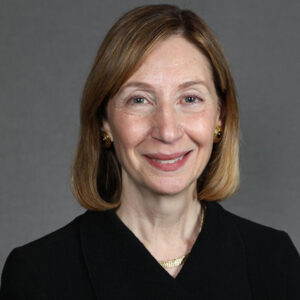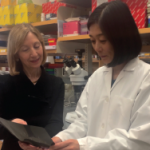 As the Asia-Pacific League of Associations for Rheumatology (APLAR) convened its 26th annual congress in Singapore this August, Ellen M. Gravallese, MD, was honored as an APLAR Master.
As the Asia-Pacific League of Associations for Rheumatology (APLAR) convened its 26th annual congress in Singapore this August, Ellen M. Gravallese, MD, was honored as an APLAR Master.
Dr. Gravallese is currently the Theodore Bevier Bayles Professor of Medicine at Harvard Medical School, Boston, chief of the Division of Rheumatology, Inflammation and Immunity at Brigham and Women’s Hospital (BWH), Boston, and was the 2019–20 ACR president. In early 2024, as is common with international partner organizations, APLAR sought nominations from the ACR for potential Master designation awardees. According to Eric Matteson, MD, MPH, chair of the ACR Global Engagement Committee, and ACR President Deborah Dyett Desir, MD, the ACR considered many candidates and nominated Dr. Gravallese in an April 2024 letter.
“Dr. Gravallese is internationally known for her work in elucidating mechanisms of inflammatory arthritis and bone remodeling,” says Dr. Matteson. “She has made important discoveries that have provided insight into the pathogenesis of diseases like rheumatoid arthritis, and led to advances in management of these diseases, and so APLAR is bestowing this high honor to her.”
The APLAR honor is one of many outgrowths of connections fostered during her ACR presidency in 2019–2020, Dr. Gravallese believes. During the shutdown imposed at the height of the COVID-19 pandemic, she notes, “I was able to meet several members of APLAR virtually in my position as ACR president, and I also gave a virtual lecture at their annual meeting during that time. I feel very connected to the people at APLAR as a result of those opportunities, and I am incredibly honored by this award.”
Multiple Roles
Dr. Gravallese’s productive career has spanned four decades, blossoming from an early research foundation to multiple academic roles as mentor, laboratory research director, clinician and administrator. Her current post as rheumatology division chief at BWH, where she has now been for five years, is a “large administrative job, with 60 faculty members in the division,” she says. Importantly, she is still able to continue her research. “It’s wonderful to both oversee this research-oriented division and to move my own laboratory investigations forward in collaboration with the people who are here in the division.”
Even before obtaining her medical degree from Columbia University, Dr. Gravallese had immersed herself in research as a Harvard College undergraduate in the laboratory of the late Guido Guidotti, PhD, Higgins professor of biochemistry. After an internship in internal medicine in 1981 at BWH, she embarked upon a five-year joint residency in pathology and internal medicine, and then joined the Harvard Medical School faculty. After her seminal 1998 work identifying osteoclasts as responsible for articular bone erosion in rheumatoid arthritis, Dr. Gravallese continued to focus on mechanisms of bone erosion and inhibition of bone repair in inflammatory arthritis while at the Harvard Institutes of Medicine. She was recruited to the University of Massachusetts Medical School in 2006 and was named a tenured professor and the Myles J. McDonough Chair in Rheumatology in 2013. Then, in 2019, she returned to BWH, coming full circle from her days as an intern there.
In recent years, Dr. Gravallese’s team has identified the essential role of the Stimulator of INterferon Genes (STING) pathway in the development of arthritis in the DNase II deficient mouse. Building on this model, several projects in her laboratory are aimed at addressing the specific role of innate immune pathways in bone, including how the cGAS/STING pathway regulates bone homeostasis.
Opportunities During the Pandemic
As noted above, the pandemic added multiple layers of activity to Dr. Gravallese’s tenure as the 83rd president of the ACR. She recalls that she appointed six task forces during that time, as well as overseeing two additional, ongoing task forces. Three of the task forces she appointed were formed to provide clinical guidance for rheumatology professionals who were, like all healthcare professionals, navigating very difficult management decisions during the pandemic, including how to deal with patients on immunosuppression.
“We produced clinical guidance documents for adult patients, but also for children, including guidance on the management of MIS-C,” Dr. Gravallese says. Guidance was also provided on how to see patients safely, address financial issues and learn how to appropriately use telemedicine. “We wrote over 30 documents for practicing rheumatologists and posted those all on a designated section of the ACR website.”
Dr. Gravallese is particularly proud of the work done by the DEI (Diversity, Equity and Inclusion) Task Force, formed immediately after the police killing of George Floyd Jr. in August 2020. “At that time we didn’t have a way to address DEI concerns at the ACR, so it was important to include a task force to address these issues.” This task force has now become a standing committee, with “an incredible champion,” in Candace H. Feldman, MD, MPH, ScD, an assistant professor of medicine in Dr. Gravallese’s division at BWH, who heads up its Diversity, Equity and Inclusion Committee and conducts research on social determinants of health.
During ACR Convergence 2023, Dr. Gravallese received the ACR Presidential Gold Medal for her contributions to the field over an entire career. The Presidential Gold Medal is the ACR’s highest award and is funded in part by the Rheumatology Research Foundation.
In remarks preceding that award, then-ACR President Douglas White, MD, PhD, said, “We could not have had a better person in the role of president at that time [COVID-19].” Dr. Gravallese is proud of the accomplishments of the ACR during the pandemic and what the task forces were able to produce for members during that difficult time. And as awards such as the APLAR Master award attest, “The reach to the rheumatology community was worldwide,” she says.
Gretchen Henkel is a health and medical journalist based in California.



